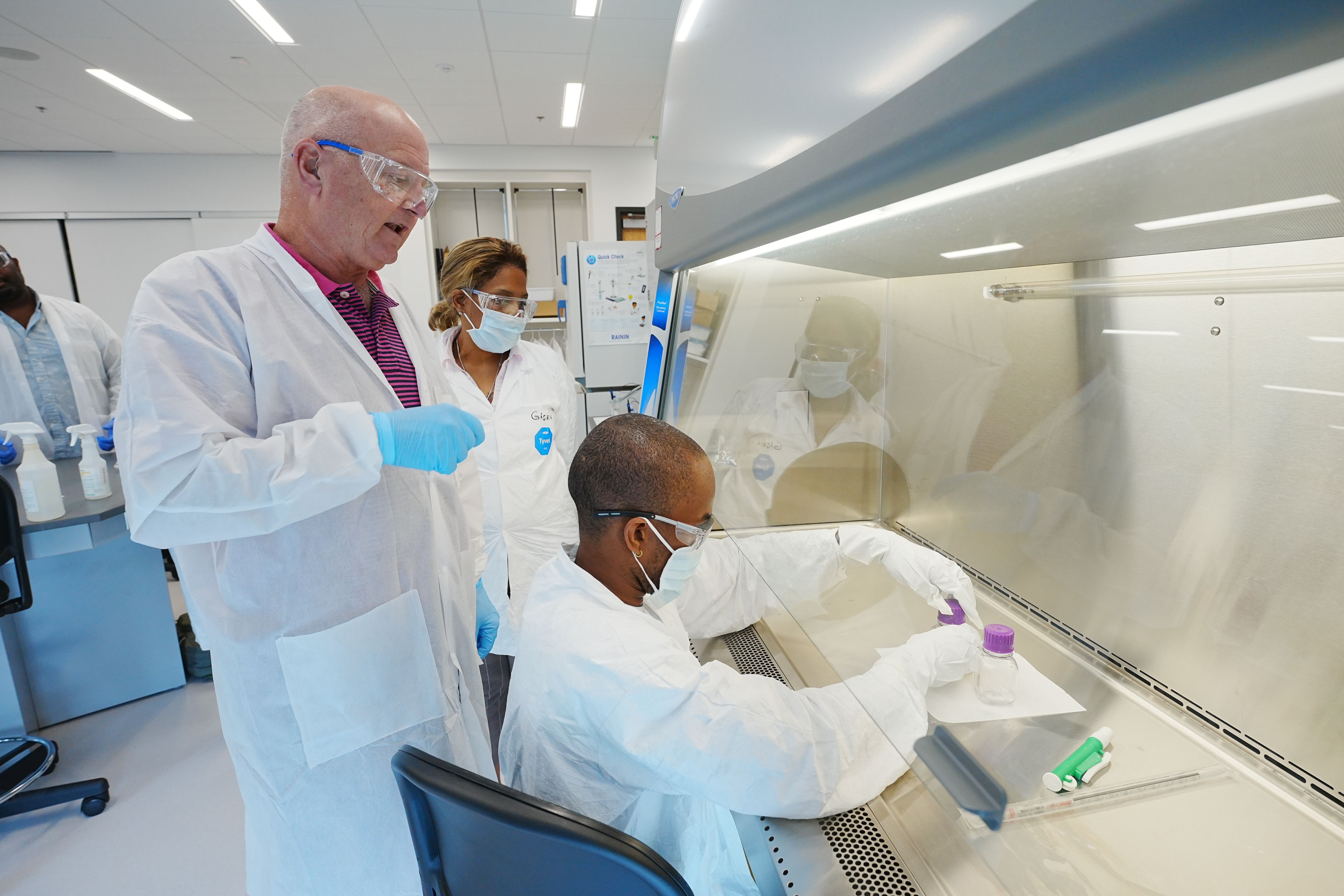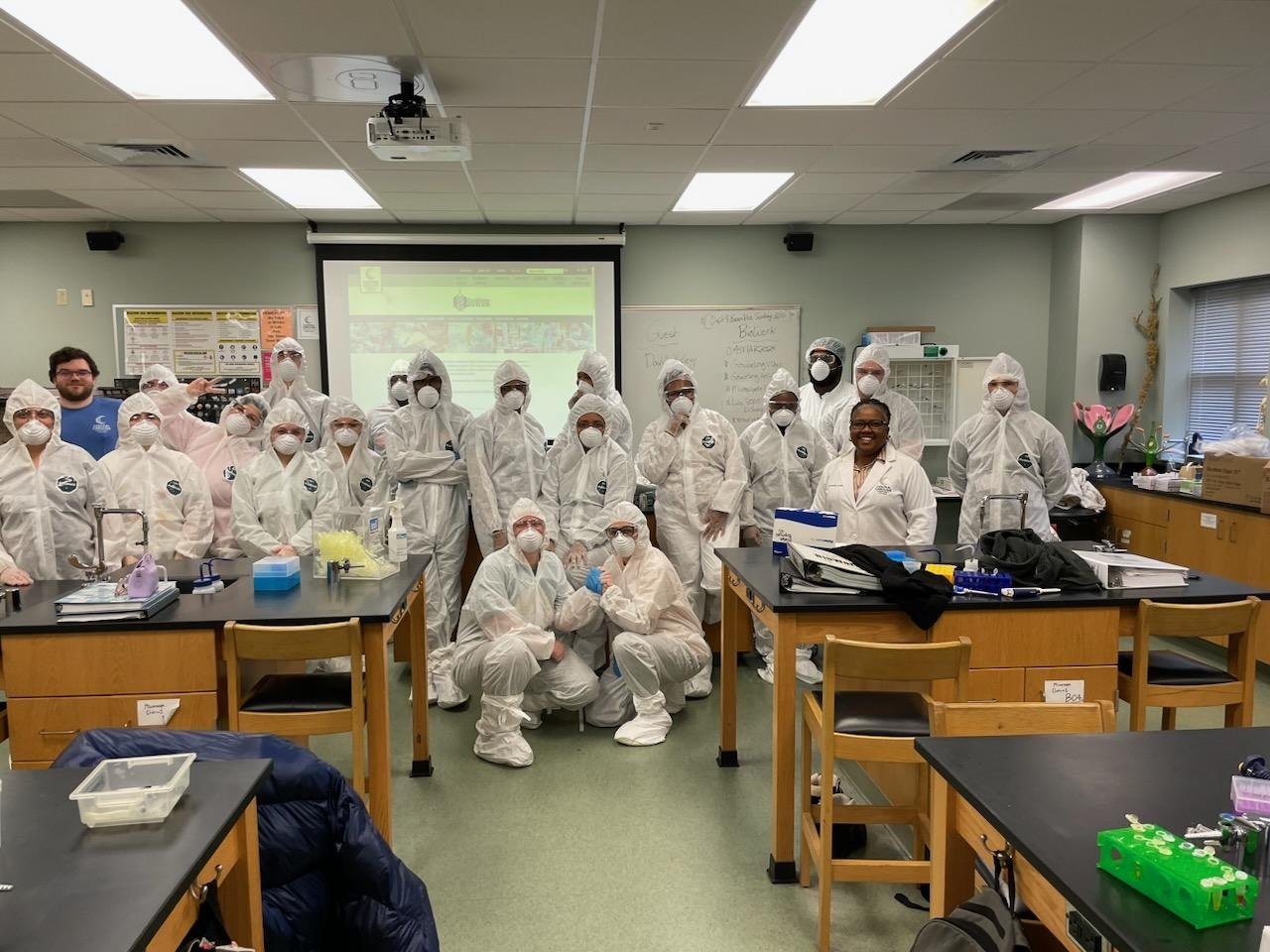Grants and Giving
Fueling Futures: How United Therapeutics is Helping Three Community Colleges Grow the Biotech Talent Pool in North Carolina
Nov 01, 2024
10 Min Read

There’s an urban legend that is as stubbornly tenacious and untrue as most scary stories told at sleepovers or around campfires in the woods.
It's this: the quality and value of education students receive at local community colleges is less than what they would receive at a four-year institution.
Like the light of day after a spooky night, the facts tell a different tale. Community colleges often excel in providing skills-based learning programs that have tight alignment between faculty, employers, and sectors, and that support direct-to-hire opportunities for graduates. For this reason and others, they are the first choice for two out of every five enrolled undergraduate students in the United States, according to the American Association of Community Colleges (AACC).Many savvy enrollees also see the return on investment of a community college degree as making more financial sense for them. In the 2023-2024 school term, average annual tuition and fees at community colleges were just under $4,000, which is about 35 percent the cost of four-year colleges at over $11,000. With a medium earning potential of more than $52,000 for associate degree earners compared to just over $35,000 for those with a high school diploma, community college programs can also be a path forward toward financial security for many.1
The North Carolina BioNetwork and BioWork certificate program was created more than 20 years ago as a collaboration between local businesses and colleges in response to the shortage of bioprocess technicians and the growing need for specialized training in the region. Almost 2,500 students have participated in the program since 2021, according to Susan Kaple, Career Development Coordinator at BioNetwork. On average, about half of BioWork students in North Carolina secure employment in the life science industry; within North Carolina, regions with substantial biopharma and company activity may have higher rates. In fact, a growing number of North Carolina-based life science companies now require the BioWork certificate for certain positions. This is a prime example of a learning and employment system that benefits students, their communities, businesses, and economies.
The success of this initiative is part of why United Therapeutics (UT) endowed scholarships at three of the 13 community colleges that offer the BioWork certificate program—Central Carolina Community College (CCCC), Wake Technical Community College (Wake Tech), and Durham Technical Community College.
This story highlights programs at two of these three colleges with whom we were able to connect before publication deadline—CCCC and Wake Tech. We also spoke with Ms. Rhonda Spruell, one of the first recipients of a grant disbursed through the endowed scholarship at CCCC, who shared her intention to move from an independent business owner in the beauty industry to the biotechnology industry.
THE BIOWORK CERTIFICATE PROGRAM
In 2023, student loans became the fastest growing household debt line item in the U.S.2 This fact has several causes, including that many higher paying jobs require advanced education to apply, which compels students to enroll and take on student loan debt. Unfortunately, the financial burden of higher education is also one of the leading causes students cite for pausing coursework or leaving school.3
The BioWork certificate program was established to support students in North Carolina from any background—recent high school graduates or working people looking to make a career pivot—to enter the life sciences industry in a way that is cost and time efficient. “I worked in the BioWork program at a community college before coming to the BioNetwork,” said Ms. Kaple. “The program is so much more than technical coursework. It’s where I developed my passion for career development. I worked with students to help them change their mindset and develop their skills to be able to move into the life science industry smoothly. Now as a member of the BioNetwork Learning Solutions Team, we help support colleges and their career navigators in guiding students through this process. We’ve created resources for resume writing and interview skills, and we partner with local biopharma companies to host both virtual and in-person career fairs.”
THE UT ENDOWED SCHOLARSHIPS
The UT endowed scholarships at all three community colleges share the same purpose: to support students enrolled in biotechnology curriculum programs. UT is otherwise not involved with the management of the endowment or selection of the scholarship recipients.

Colin Dietch, Sr. Director and Assistant General Counsel
The idea of establishing endowments to support students enrolled in the BioWork program at participating colleges was led by Colin Dietch, Senior Director and Assistant General Counsel at UT. “My mom retired from a community college in a county that had two things going for it: tobacco and textiles. When these industries left, there was a serious collapse of opportunity for many. I saw how local community colleges punched above their weight to provide training for people at all stages of their career. Financial support can make a real difference for students. Working on this project for UT inspired me to go home and endow a fund at the community college where my mom worked—in fact, I donated some of my UT stock!”
As a public benefit corporation, UT strives to contribute positively to the communities in which we live and work. Obviously, one benefit to any company establishing an endowed scholarship is that it can help increase the pool of talent from which employers can recruit future employees. “Setting up these UT Endowed Scholarships helps us get our name out there in front of students who want to be part of our industry,” Colin said. “In time, I hope it will contribute to our success in recruiting and retaining highly skilled employees.”
ENDURING ENDOWMENTS VS. SHORT-LIVED SCHOLARSHIPS
The rationale for setting up endowed scholarships versus one-time-only scholarships was an easy one for Colin and Avi Halpert, VP of Government Affairs and Community Relations at UT, whose department is a financial sponsor of the endowments. “You only need to set up an endowment once after which the school foundation disburses scholarships based on the investment income,” Avi explained. “Plus, the endowment lives on in perpetuity—long after Colin and I retire.”
Endowments are incredibly powerful tools to help local colleges recruit and retain students seeking better employment.
“Endowments provide a pot of money that will last forever from which we draw investment income that funds our scholarships,” Leslie Isenhour, Dean of the Biotechnologies Division of Wake Tech explained. “The UT scholarship will fund about one-third the cost of college for a student annually, which helps make higher education more attainable and accessible.”
“You only need to set up an endowment once after which the school foundation disburses scholarships based on the investment income. Plus, the endowment lives on in perpetuity—long after Colin and I retire."
“You only need to set up an endowment once after which the school foundation disburses scholarships based on the investment income. Plus, the endowment lives on in perpetuity—long after Colin and I retire."

Wake Tech students and faculty
About Wake Tech
- The largest community college in North Carolina, serving more than 70,000 students annually
- Offers four specialty biotechnology programs, which graduated almost 800 students across all programs since 2016, including more than 600 students through the BioWork program between 2018 and 2022
- Engages high school students through its Wake Early College of Information and Biotechnologies in courses taught by experienced Wake Tech faculty
- Soon to open a 10,000 sq. ft. biopharmaceutical simulated drug facility suite, supported by sustainable energy
https://www.waketech.edu/programs-courses/field/biotechnology
Skills-based talent development programs like BioWork have proven their value to industry. The value to individual students, their families, and their communities can be even greater.
"I’ve been doing this work for 14 years,” Dr. Emily Hare, Executive Director of the CCCC Foundation shared. “A two-year degree at a community college enables many students to earn family-sustaining wages they could not earn before. And a scholarship can mean that a student stays in school, or she doesn’t have to take a second job to make ends meet, or she can pay for childcare, or maybe she now can afford to buy the gasoline she needs to drive herself from home to class and back for the semester. It's game changing."
The CCCC has had a biotech program that surged with the growth of the sector in the region. “BioWork is often where our students start,” said Ms. Isenhour. “Many go on to other certificate or associate degree programs, and we have established a transfer option with East Carolina University to enable those who wish to go into the Bachelor of Science in Industrial Technology.”

CCCC BioWork students with biotechnology instructor Dr. Brenda Grubb
About CCCC
- Serves up to 6,000 students annually
- More than 200 students enrolled in the biotech program, including those enrolled in BioWork
Both colleges provide additional support services to students in their programs to help them navigate life challenges as they pursue their education. For example, they offer food pantries, support to access county services if needed, mentors, coaching and more. “We’re in the business of changing lives for the better,” said Dr. Hare.
HELPING PEOPLE ALL OVER THE WORLD
Rhonda Spruell had been working in the beauty industry for more than 30 years when the COVID 19 pandemic disrupted life everywhere. “Salons were shut down, so I sat down with my husband at the kitchen table and said, ‘I think I want to change careers and go back to topics I really loved in high school, like math and chemistry.’” With her spouse’s support and encouragement, Rhonda started on a journey toward the biotech industry.
“It has been a good change,” Ms. Spruell explained. Not only has she completed two certificate programs, is now completing her associates degree in biotechnology at CCCC, and participated in The National Institute for Innovation in Manufacturing Biopharmaceuticals (NIIMBL®)4 eXperience this summer, she has done so while working full-time.
Ms. Spruell’s passion is helping people, which has helped her manage the extra load. “A visiting pastor told me once, ‘You will be helping people all over the world.’ Later, when my BioWork’s professor Evan Riley basically said the same thing about the field of biotechnology—well, I knew it was for me.” Ms. Spruell wrote a letter of thanks to Avi upon receiving a scholarship through the creation of the endowment. “I have learned that if you push past your pain, you can’t do anything but succeed, grow, and be strengthened, and that’s where I am on my journey,” she wrote. To Avi, receiving that letter was an earmark of the success of the program. “Knowing there’s a human being who is being positively impacted by what we did. Putting a name to that person, that’s enough for me to know this was money well spent,” Avi shared.
Biotechnology is creative work. We need creative minds who think differently to work together to find better solutions for our patients. We want to find those people wherever they are today, retain those who have joined us to solve the problems we face now, and nurture those future leaders who will build on these efforts to create the solutions of tomorrow. Finding the right partners who can help us fuel that talent pool, well, that just makes it easier.
UNITED NATIONS SUSTAINABLE DEVELOPMENT GOALS (UN SDGS)
UT’s Endowed Scholarship program aligns with multiple goals, but especially UN SDGs 3, 4, and 8.
![]()
![]()
![]()
1. Fast Facts 2024. AACC. https://www.aacc.nche.edu/research-trends/fast-facts/
2. Student loan debt in the United States – statistics and facts. Statista. https://www.statista.com/topics/11983/student-loan-debt-in-the-united-states/"topicOverview
3.Reasons Students Consider Leaving or Stopping Out: Insights from the 2023 Diverse Learning Environments Survey. American Council on Education. https://www.acenet.edu/News-Room/Pages/Diverse-Learning-Environments-Stop-Out-Brief.aspx and Marken, Stephanie. Mental Health, Stress Top Reasons Students Consider Leaving. Gallup News. https://news.gallup.com/poll/644645/mental-health-stress-top-reasons-students-consider-leaving.aspx
4. NIIMBL is an exclusive, in-person, all-expense-paid immersion program that offers students real-world insight into biopharmaceutical industry careers. https://www.niimbl.org
***
United Therapeutics Corporation converted to a public benefit corporation (PBC) in 2021—the first publicly-traded biopharmaceutical company to do so. Our PBC purpose has two parts: to create a brighter future for patients through the development of novel pharmaceutical therapies and technologies that expand the availability of transplantable organs. Our first purpose helps delay or avoid the need for a transplant, while the second purpose enables a patient to have a transplant when they need one.
We align our PBC purpose with three pillars: our patients, our people, and our planet. We believe our people are the key to our success in our other two pillars, which is why we seek to be a destination employer.
United Therapeutics offers many benefits and amenities to attract and retain those talented, passionate employees who will help us bring our vision to fruition. For that reason, we support the continuing education for our full-time employees who are eligible for up to $45,000 reimbursement over the course of their UT career. Learn more about our benefits and amenities here: https://www.unither.com/careers/benefits-and-amenities.